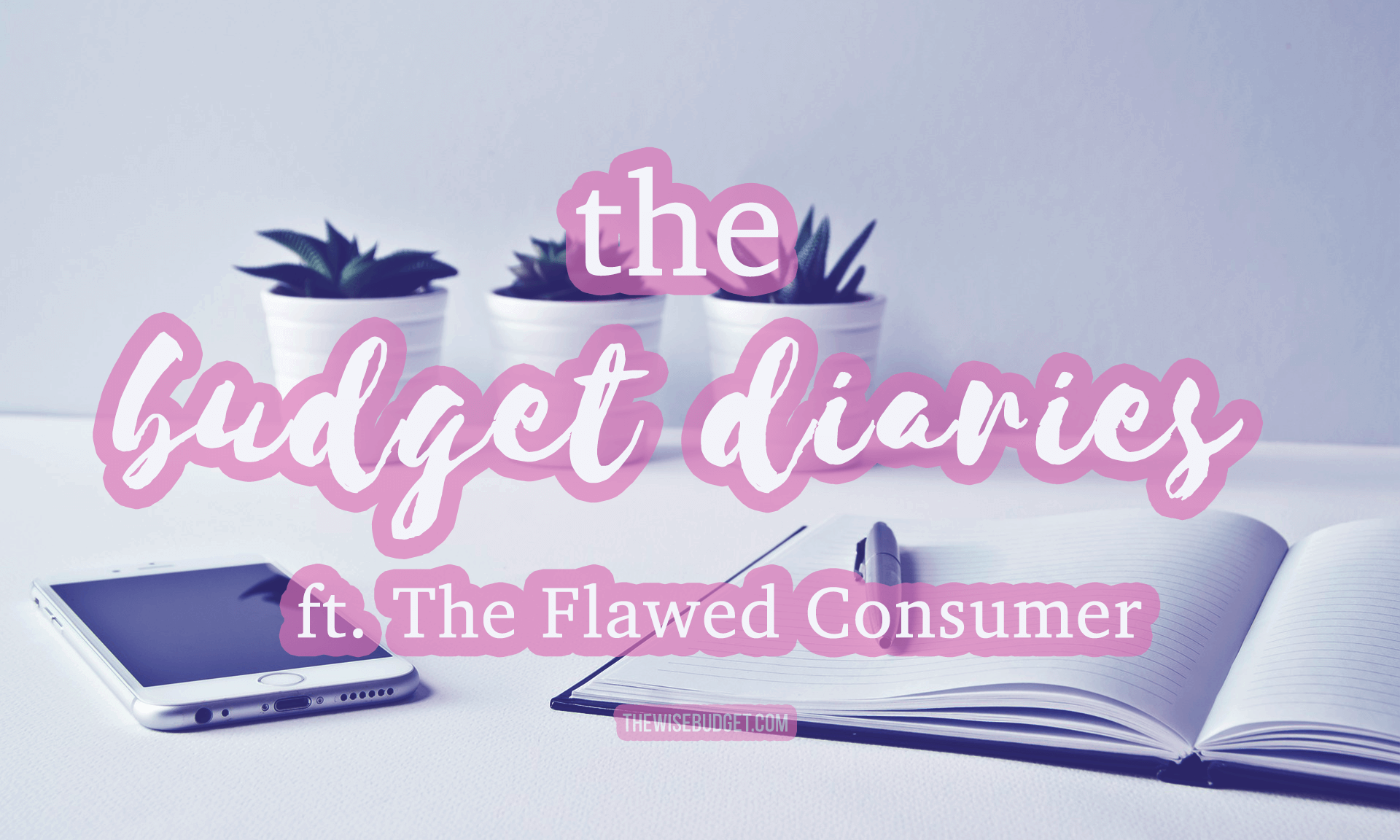The Budget Diaries: The Flawed Consumer

Welcome to The Budget Diaries! The Budget Diaries pays homage to some of my favorite blog post series, the Money Diaries of Refinery29 and Cosmopolitan Magazine. In this series, I’ll be interviewing fellow bloggers about their budgeting habits, giving us a small peek into their financial lives.
For this week, we’ll be interviewing TFC, a personal finance blogger at The Flawed Consumer, a blog focused on helping young families achieve their financial goals.
Hi, thank you for agreeing to this interview! Will you tell us a bit about yourself?
Hi! I’m TFC/The Flawed Consumer, from theflawedconsumer.com.
Throughout my 20’s, I made a lot of stupid financial mistakes that are costing me in my 30’s. In order to help others avoid being like me, I created The Flawed Consumer to document my transition from being a “Keeping Up With The Jones’” type spender, to becoming financially independent, secure and savvy.
My mission is to pass along my financial learnings (successes and failures) to others, throughout my transition, to empower them to get their personal finances under control.
Since starting The Flawed Consumer in May 2017, my beloved and I have:
- Increased our saving rate from 5-25%;
- Cut our expenses by about a third through frugal living, bulk buying and meal preparation;
- Paid off a $3000 credit card debt;
- Paid off a $10,000 car loan 2 years ahead of schedule;
- Increased our long term savings by $13,000;
- Established a modest emergency account;
- Negotiated better deals on electricity, phone, internet and insurances; and
- Developed money saving, rather than money spending hobbies such as gardening and home brewing.
Overall, in just under 18 months, we’ve increased our net wealth by $75,267 through debt reduction, cutting living expenses and increasing our savings percentage.
Do you keep a consistent budget? How did you start budgeting?
Yes. But this isn’t something we’ve always done. In times gone by, we would make a budget, stick to it for a few weeks and then throw it out the window when we wanted something that didn’t comply with the budget.
We first started budgeting in our early 20’s. However, we never stuck with it. As typical folk in our 20’s we were good at enjoying ourselves; having a good time and accumulating stuff… But, were not good at saving or investing money.
However, we now have a budget that works for us and is sustainable. We’ve set up our income to automatically transfer to our daily expenses, travel/home improvements, savings, emergency and spending accounts; and we don’t spend outside of our allocations.
How much is your typical weekly budget?
Between the two of us, our weekly budget is $2000. 20% of this goes into our long term savings, 10% into our travel/home improvements account, 10% into our spending accounts and just over 50% is for the living expenses account.
The residual, plus any overtime, bonuses or pay increases goes across to our emergency account each week.
What’s a typical week of expenses for you?
Our daily expenses don’t really vary much from day-to-day, other than commuting costs during the week, so I’ll just break down our weekly expenses.
Our typical weekly expenses look like this ($ = AUD):
- Mortgage: $575
- Car running costs (fuel, registration, maintenance): $52.30
- Public transport (commuting to and from work): $65
- Groceries (inc food, toiletries, pet food, etc): $130
- Insurances (home/contents, car and health): $20 + $7.70 + $9.25 = $36.95
- Subscriptions (spotify and netflix): $3 + 4.50 = $7.50
- Electricity: $32.50
- Phones: $33.75
- Internet: $25
- Water: $30
- Pet food and vets: $39.25
- Charity donations: $5
- Average medical costs (Dr, dentist, chiro, physio)): $20
- Average house maintenance = $50
Total weekly living expenses = $1102.25
What do you think is the hardest thing about budgeting (or not budgeting?
Finding a budget that truly works for you and is therefore sustainable in the long term.
When you first start budgeting, it’s quite often because your finances aren’t in good shape, or you’ve fallen victim to Lifestyle Creep, and you want to make some serious changes. As money is tight, you tend to be very strict about the budget and not allow yourself much for “fun” or spending on non-essentials.
This can work in the short-term as a form of financial detox, but most people get over being so tight pretty quickly and often give up… After all, if you can’t enjoy yourself just a little bit, what’s the point of working five days a week, right?
Consequently, I think the hardest thing about budgeting is figuring out a budget that allows you to work towards your debt reduction and savings goals, whilst allowing yourself some fun in the sun, so to speak.
However, this isn’t always easy to achieve. Especially if you’re a single parent or on a low income. In these situations, expense reduction through frugal living can be quite effective at freeing up cash. But, this is not always possible as you might be stretched to your limits and have no room to budge. This makes budgeting very difficult as you feel as though there’s no light at the end of the tunnel.
But, it is these scenarios where budgeting is most important and can have the most significant impact on overall mental well-being, especially when you find yourself freeing up a few dollars here and there for saving and investing.
What advice can you give to anyone who’s interested in budgeting?
Figure out what is sustainable for you and stick to it. It might take you a few different budgets to find what works for you, so don’t give up!
Budgeting can seem overwhelming, daunting, and like a complete pain in the arse at times, but in my experience, it truly is the best way to get on top of your finances.
Once you have a sustainable budget figured out, automate your payments to make it easy for yourself. We have set up automatic payments to our billers each payday for daily expenses such as electricity, phone, water, insurances. Additionally, for bills we can’t set up regular direct debits for, we have an automatic payment set up each payday which goes across into a bills account. This means that we never have bill shock, as they’re either paid in advance, or money is already allocated for them.
Having automated payments set up like this makes budgeting super simple and easy. Which, in turn, makes it easy to stick to.
Anything to say to our dear readers?
Hi there! Budgeting, cutting expenses and saving can seem overwhelming, impossible, and, at times, boring! But, here’s the thing… It’s empowering and exciting as hell actually! I mean, what’s more exciting than becoming financially free and not having to worry about money?!
If you’re like I was 18 months ago, and don’t know where to start to get your finances under control, my advice is to take it one step at a time:
- Step 1, figure out your expenses and slowly cut these back (where you can) one-by-one.
- Step 2, figure out a sustainable budget you can stick to.
- Step 3, automate weekly/fortnightly/monthly savings transfers when you get paid so you’re not tempted to touch this money.
- Step 4, repeat as necessary and watch your net wealth grow.
Thank you so much and may you always lead a financially free life!
You’re most welcome. Thanks for asking me to share my story!
Follow TFC in her adventures at The Flawed Consumer:
✨Blog✨
✨Twitter✨
✨Facebook✨
✨Pinterest✨
If you want to check out the other posts in this series, take a look at this link right here.
Have something to share? If you’d like to be a part of this series, feel free to email me at write@thewisebudget.com! I’m looking forward to having you here!







Black Hairstyles
I do not even understand how I ended up right here, however I thought this post was great. I do not recognise who you’re however definitely you are going to a famous blogger when you are not already 😉 Cheers!
Damien Zumbo
Wow that was strange. I just wrote an extremely long comment but after I clicked submit my comment didn’t appear. Grrrr… well I’m not writing all that over again. Anyways, just wanted to say wonderful blog!
Patrick D. Seal
✅ 100% Online Convenience
Gone are the days of standing in line at a financial office. With services like SimplePret.ca and GetMyPayToday.ca, you can apply anytime, from anywhere in Canada.